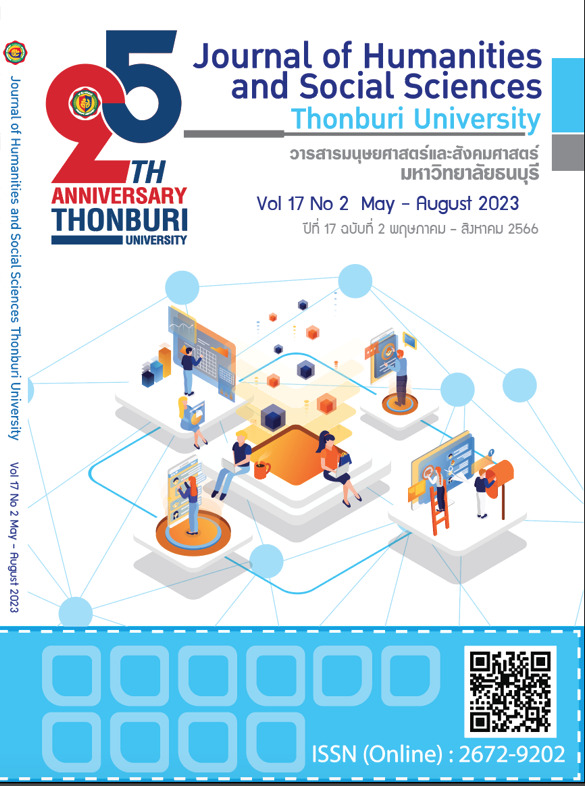แบบแผนการส่งเสริมภาวะผู้นำการเปลี่ยนแปลงสำหรับนายทหารสัญญาบัตรด้วยแนวคิด การเรียนรู้สู่การเปลี่ยนแปลงและองค์กรแห่งการเรียนรู้เพื่อการเป็นกองทัพเรือแห่งการเรียนรู้ตลอดชีวิต
Main Article Content
บทคัดย่อ
การศึกษานี้เป็นการวิจัยและพัฒนามีวัตถุประสงค์เพื่อ 1) เพื่อศึกษาสภาพปัจจุบัน สภาพที่พึงประสงค์และความต้องการจำเป็นในการพัฒนาคุณลักษณะและภาวะผู้นำการเปลี่ยนแปลงของบุคลากรกองทัพเรือเพื่อการเป็นกองทัพเรือแห่งการเรียนรู้ตลอดชีวิต 2) เพื่อพัฒนาแบบแผนการส่งเสริมภาวะผู้นำการเปลี่ยนแปลงสำหรับนายทหารสัญญาบัตร และ 3) เพื่อประเมินแบบแผนแผนการส่งเสริมภาวะผู้นำการเปลี่ยนแปลงสำหรับนายทหารสัญญาบัตร การวิจัยแบ่งเป็น 3 ระยะ กลุ่มตัวอย่างประกอบด้วย 3 กลุ่ม กลุ่มแรกคือ นายทหารสัญญาบัตรสังกัดกองทัพเรือที่ปฏิบัติงานด้านการบริหารจัดการและวางแผนพัฒนาทรัพยากรมนุษย์ของกองทัพเรือ จำนวน 155 คน และนายทหารสัญญาบัตรนักเรียนเสนาธิการทหารเรือ จำนวน 86 คน กลุ่มที่ 2 ผู้มีส่วนได้ส่วนเสียในองค์กร จำนวน 15 คน และกลุ่มที่ 3 ได้แก่ ผู้ทรงคุณวุฒิด้านการเรียนรู้ตลอดชีวิต และองค์กรแห่งการเรียนรู้ ผลการวิจัยพบว่า 1) นายทหารสัญญาบัตรที่เป็นกลุ่มตัวอย่างเห็นว่ามีความต้องการจำเป็นในการพัฒนาภาวะผู้นำการเปลี่ยนแปลงของนายทหารสัญญาบัตรสังกัดกองทัพเรือด้านการกระตุ้นทางปัญญาสูงที่สุด รองลงมาได้แก่ การทำงานเป็นแบบอย่าง และการส่งเสริมกำลังใจตามลำดับ 2) แบบแผนการส่งเสริมภาวะผู้นำการเปลี่ยนแปลงสำหรับนายทหารสัญญาบัตรเป็นแบบแผนที่ดำเนินการในแบบผสมระหว่างแนวทางการส่งเสริมผ่านนโยบายจากองค์กรสู่หน่วยงานในองค์กร การส่งเสริมผ่านนโยบายจากหน่วยงานสู่องค์กร และการส่งเสริมทีมในหน่วยงานขององค์กร ประกอบด้วยการดำเนินการ 4 ระดับ ระดับบุคคลได้แก่ อาจารย์และผู้เรียน 3 องค์ประกอบ ระดับกรมยุทธศึกษาทหารเรือ 10 องค์ประกอบ ระดับกรมในกองทัพเรือ 15 องค์ประกอบ และระดับกองทัพเรือ 7 องค์ประกอบ และ 3) ผลการประเมินแบบแผนการส่งเสริมภาวะผู้นำการเปลี่ยนแปลงสำหรับนายทหารสัญญาบัตรมีความเหมาะสมอยู่ในระดับมากที่สุด
Article Details

This work is licensed under a Creative Commons Attribution-NonCommercial-NoDerivatives 4.0 International License.
ผลงานที่ปรากฎในวารสารฉบับนี้เป็นลิขสิทธิ์เฉพาะส่วนบุคคลของผู้เขียนซึ่งต้องรับผิดชอบต่อผลทาง กฎหมายที่อาจเกิดขึ้นได้และไม่มีผลต่อกองบรรณาธิการReferences
จุลชีพ ชินวรรโณ. (2557). โลกในศตวรรษที่ 21 : กรอบการวิเคราะห์ความสัมพันธ์ระหว่างประเทศ = The world in the 21st century: analytical framework of international relations. กรุงเทพฯ: โรงพิมพ์แห่งจุฬาลงกรณ์มหาวิทยาลัย.
รณยุทธ ขวัญมงคล. (2566). การพัฒนาข้อเสนอเชิงนโยบายการส่งเสริมภาวะผู้นําสําหรับนายทหารสัญญาบัตรเพื่อนํากองทัพเรือสู่การเป็นองค์กรแห่งการเรียนรู้ตลอดชีวิต. วิทยานิพนธ์ ปริญญาครุศาสตร์ดุษฎีบัณฑิต สาขาการศึกษานอกระบบโรงเรียน ภาควิชาการศึกษาตลอดชีวิต คณะครุศาสตร์ จุฬาลงกรณ์มหาวิทยาลัย.
วสันต์ อติศัพท์. (2550). ทิศทางใหม่ของนวัตกรรมทางเทคโนโลยีการศึกษา: กระบวนทัศน์ใหม่ของนักเทคโนโลยีการศึกษาและการเตรียมครูแห่งอนาคต. เอกสารประกอบการสัมมนาโสต-เทคโนสัมพันธ์ครั้งที่ 16. เชียงใหม่: มหาวิทยาลัยเชียงใหม่.
สํานักงานคณะกรรมการการศึกษาแห่งชาติ. (2543). ปฏิรูปการเรียนรู้ผู้เรียนสําคัญที่สุด. กรุงเทพฯ: พิมพ์ดี.
สํานักงานเลขาธิการสภาการศึกษา. (2553). ข้อเสนอการปฏิรูปการศึกษาในทศวรรษที่สอง (พ.ศ. 2552-2561). กรุงเทพฯ: พริกหวานกราฟฟิค.
สุมาลี สังข์ศรี. (2544).รายงานการวิจัยการศึกษาตลอดชีวิตเพื่อพัฒนาสังคมไทยในศตวรรษที่21. กรุงเทพฯ: สำนักงาน คณะกรรมการศึกษาแห่งชาติ.
สุวิธิดา จรุงเกียรติกุล. (2554). อนาคตภาพรูปแบบสังคมแห่งการเรียนรู้เพื่อการปรับเปลี่ยนกระบวนทัศน์เชิงบวกสำหรับชุมชน. วิทยานิพนธ์ ปริญญาครุศาสตร์ดุษฎีบัณฑิต สาขาการศึกษานอกระบบโรงเรียน ภาควิชาการศึกษาตลอดชีวิต คณะครุศาสตร์ จุฬาลงกรณ์มหาวิทยาลัย.
สุวิมล ว่องวาณิช. (2550). การวิจัยประเมินความต้องการจําเป็น. พิมพ์ครั้งที่ 2. กรุงเทพฯ: สํานักพิมพ์แห่งจุฬาลงกรณ์มหาวิทยาลัย.
อังกูร เถาวัลย์. (2562). ภาวะผู้นำการเปลี่ยนแปลงของผู้บริหารสถานศึกษาที่ส่งผลต่อการเป็นองค์กรแห่งการเรียนรู้ในสถานศึกษา สังกัดสำนักงานเขตพื้นที่การศึกษามัธยมศึกษา เขต 17. วิทยานิพนธ์ครุศาสตรมหาบัณฑิต (การบริหารการศึกษา). จันทบุรี: มหาวิทยาลยราชภัฎรำไพพรรณี.
อาชัญญา รัตนอุบล. (2557). รวมบทความทางวิชาการ เรื่อง การศึกษาและการเรียนรู้ตลอดชีวิต.กรุงเทพฯ: โรงพิมพ์แห่งจุฬาลงกรณ์มหาวิทยาลัย.
Bakker, A. B. & Schaufeli, W. B. (2008). Positive organizational behavior: engaged employees in flourishing organizations. Journal of Organizational Behavior, 29(2), 147-154.
Bass, B.M. & Riggio, R.E. (2006). Transformational Leadership. 2nded. NewJersey: Lawrence Erlbaum Associates.
Coghlan, D. (1993). A person-centred approach to dealing with resistance to change. Leadership & Organization Development Journal, 14(4), 10-14.
Drucker, F. P. (1993). Post-Capitallst Society. New York: Harperbusiness.
Duck, J. D. (1993). Managing change: the art of balancing. Harvard Business Review, 71(6), 109-118.
Freire, P. (2012). Pedagogy of the oppressed. Translated by Myra Bergman Ramos. New York: Continuum International Publishing Group.
Gavin, D. (1993). Building a learning organization. Harvard Business Review. 71, 78-91.
Kotter, J. P. & Cohen, D. S. (2002). The Heart Of Change. Boston, Massachusetts: Harvard.
Kotter, J.P. (1996). Leading Change. Boston, MA: Harvard Business School Press .
Kouzes, J. M. & Posner, B. Z. (1993). The leadership challenge : How to get extraordinary things done in organizations. San Francisco: Jossey - Bass.
Leithwood, K. A. (1992). The Move Toward Transformational Leadership. Educational Leadership. 49(5), 8-12 EJ 439275
Marquardt, M. J. (1996). Building the Learning Organization: A System Approach to Quantum Improvement and Global Success. New York: McGraw-Hill.
Mezirow, J. (1991). Transformative Dimensions of Adult Learning. San Francisco: Jossey Bass Publisher.
Mezirow, J. (2000). Learning as Transformation: Critical Perspectives on a Theory in Progress. The Jossey - Bass Higher and Adult Education Series. San Francisco: Jossey-Bass.
OECD. (1998). Public management reform and economic and social development. Retrieved from http://www.oecd.org/puma/online.htm.
Pietersen, W. (2002). The Mark twain Dilemma: the theory and practice of change. leadership. Journal of Business Strategy, 23 (5), 32-37.
Ranson, S. (1994). Towards the Learning Society. London: Cassell.
Roger G., Niall L. and Douglas C. P. (1998). Administrative Process. New Delhi: Penrice Hall of India.
Schon, D. A. (1983). The Reflective Practitioner: How Professionals Think in Action. New York: Basic Books
Senge, P.M. (1990). The fifth discipline: The art and practice of the learning organization. London: Century Press.
UNESCO. (2005). Decade of education for sustainable development: 2005-2014. Draft International Implementation Scheme.
Waltz, K. (1979). Theory of International Politics. London: Addison-Wesley.
Wendt, A. (1992). Anarchy is what States Make of It: the Social Construction of Power Politics. International Organization, 46(2): 391-425.
Yamazakia, Y. & Petchdee, S. (2015) . Turnover Intention, Organizational Commitment, and Specific Job Satisfaction among Production Employees in Thailand. Journal of Business and Management, 4(4), 22-38.
Yarbrough, D.B., Shulha, L.M., Hopson, R.K. and Caruthers, F.A. (2011). The Program Evaluation Standards: A Guide for Evaluators and Evaluation Users. Thousand Oaks: SAGE Publishing.
Translated Thai References
Atisabda, W. (2007). Direction of innovation in educational technology: A new paradigm of educational. technologists and preparing the teachers of the future. Documents for the 16th Audio-Techno- Relationship Seminar. Chiang Mai: Chiang Mai University. (in Thai)
Charungkiattikul, S. (2011). The scenario of a learning society model toward a positive paradigm shift for communities. Dissertation for the Doctor of Philosophy Program in Non-formal Education Department of Lifelong Education Faculty of Education. Chulalongkorn University. (in Thai)
Chinwanno, C. (2014). The world in the 21st century: analytical framework of international relations. Bangkok: Chulalongkorn University. (in Thai)
Kwanmongkol, Ronnayut. (2023). Development of Leadership Policy Proposal for Naval Commissioned Officer to Lead Royal Thai Navy Toward Being A Lifelong Organization. Dissertation for the Doctor of Philosophy Program in Non-formal Education Department of Lifelong Education Faculty of Education. Chulalongkorn University. (in Thai)
Office of the Education Council: ONEC (2010). Educational reform proposals in the second decade (2009- 2018). Bangkok: PRIKWARN GRAPHIC CO.,LTD. (in Thai)
Office of the National Education Commission. (2000). Learning reform, learners are the most important. Bangkok: Pimdee press. (in Thai)
Rattanaubon, A. (2014). Non-formal Education for Lifelong Learning Enhancement .Bangkok: Department of non-formal education. Faculty of education. Chulalongkorn University. (in Thai)
Sungsri, S. (2001). Lifelong Education Research Report for the Development of Thai Society in the 21st Century. Bangkok: Office of the National Education Commission. (in Thai)
Thaowan, A. (2019). School Administrators’ Transformational Leadership that Affects Learning Organizations under the Secondary Educational Service Area Office 17. Thesis M.Ed. (Educational Administration). Chantaburi: Rambhai Barni Rajabhat University. (in Thai)
Wongwanich, S. (2007). Need assessment research. 2nded. Bangkok: Chulalongkorn University. (in Thai)

